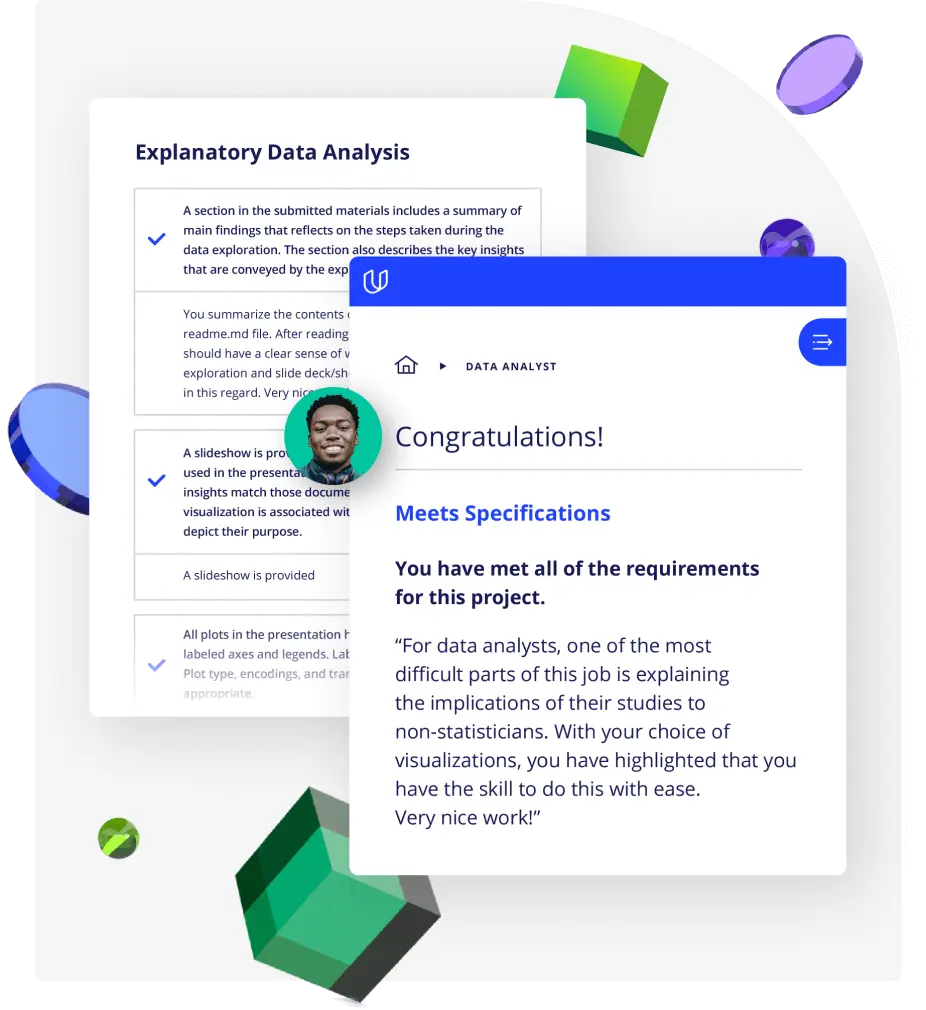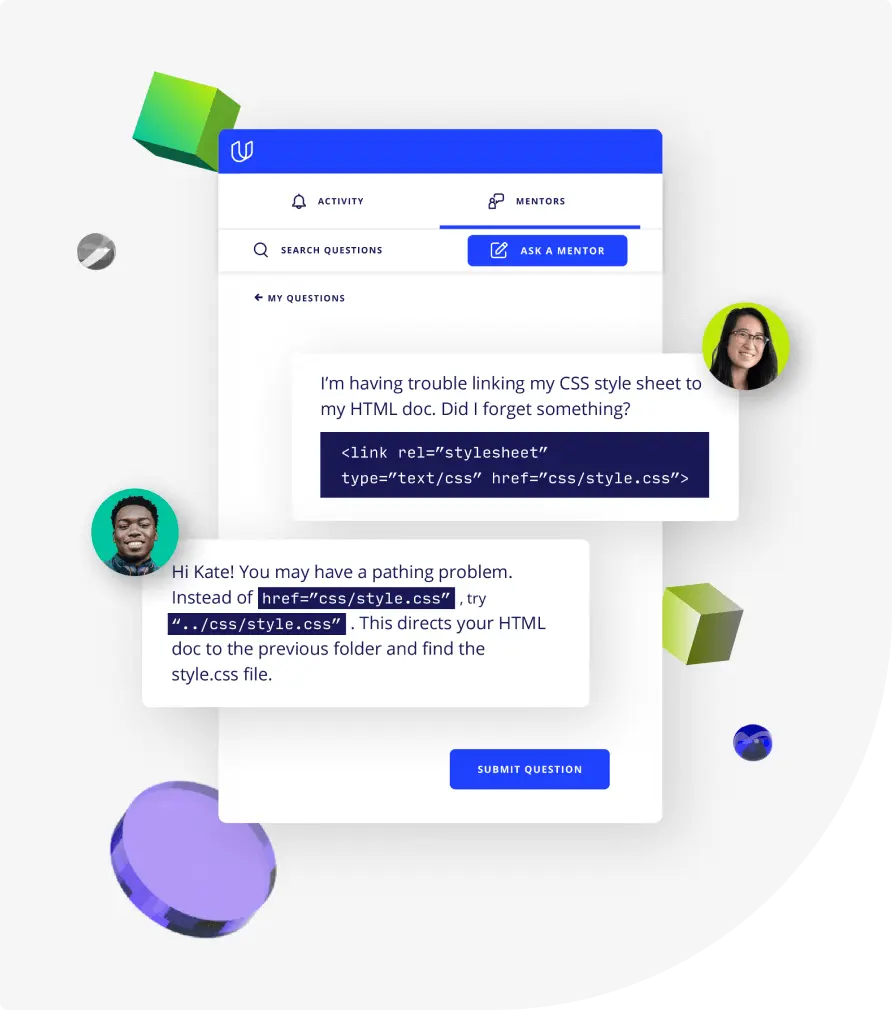Lesson 1

Introduction to SQL
Course
SQL is one of the most versatile tools available for extracting insights from stored data. Learn how to execute core SQL commands to define, select, manipulate, control access, aggregate, and join data and data tables. Understand when and how to use subqueries, several window functions, and partitions to complete complex tasks. Clean data, optimize SQL queries and write select advanced JOINs to enhance analysis performance, explain which cases you would want to use particular SQL commands, and apply the results from queries to address business problems.
SQL is one of the most versatile tools available for extracting insights from stored data. Learn how to execute core SQL commands to define, select, manipulate, control access, aggregate, and join data and data tables. Understand when and how to use subqueries, several window functions, and partitions to complete complex tasks. Clean data, optimize SQL queries and write select advanced JOINs to enhance analysis performance, explain which cases you would want to use particular SQL commands, and apply the results from queries to address business problems.
Beginner
4 weeks
Real-world Projects
Completion Certificate
Last Updated March 13, 2024
Skills you'll learn:
Prerequisites:
No experience required
Course Lessons
Lesson 2
Basic SQL
In this section, you will gain knowledge about SQL basics for working with a single table. You will learn the key commands to filter a table in many different ways.
Lesson 3
SQL Joins
In this lesson, you will learn how to combine data from multiple tables together.
Lesson 4
SQL Aggregations
In this lesson, you will learn how to aggregate data using SQL functions
Lesson 5
SQL Subqueries & Temporary Tables
In this lesson, you will learn about subqueries, a fundamental advanced SQL topic. This lesson will walk you through the appropriate applications of subqueries, the different types of subqueries, and review subquery syntax and examples.
Lesson 6
SQL Data Cleaning
Cleaning data is an important part of the data analysis process. You will be learning how to perform data cleaning using SQL in this lesson.
Lesson 7
SQL Window Functions
Window functions allow users to compare one row to another without doing any joins using one of the most powerful concepts in SQL data analysis.
Lesson 8
SQL Advanced JOINS & Performance Tuning
Learn advanced joins and how to make queries that run quickly across giant datasets. Most of the examples in the lesson involve edge cases, some of which come up in interviews.
Lesson 9
Congratulations
Lesson 10 • Project
Deforestation Exploration
In this project, students will be putting their SQL skills to the test to help determine where to concentrate efforts to combat deforestation.
Taught By The Best

Ziad Saab
Software Developer and Co-Founder DecodeMTL
Ziad is a seasoned software developer who loves mentoring and teaching. Currently working as an independent contractor, he previously co-founded and taught full-stack web development at DecodeMTL, Montreal's first web development bootcamp.

Derek Steer
CEO at Mode
Derek is the CEO of Mode Analytics. He developed an analytical foundation at Facebook and Yammer and is passionate about sharing it with future analysts. He authored SQL School and is a mentor at Insight Data Science.

Malavica Sridhar
Senior Product Manager at CircleUp
Malavica is a Senior Product Manager with over five years of experience. Her work includes building Helio, an ML platform used to identify breakout brands in early-stage consumer packaged goods companies.
The Udacity Difference
Combine technology training for employees with industry experts, mentors, and projects, for critical thinking that pushes innovation. Our proven upskilling system goes after success—relentlessly.

Demonstrate proficiency with practical projects
Projects are based on real-world scenarios and challenges, allowing you to apply the skills you learn to practical situations, while giving you real hands-on experience.
Gain proven experience
Retain knowledge longer
Apply new skills immediately

Top-tier services to ensure learner success
Reviewers provide timely and constructive feedback on your project submissions, highlighting areas of improvement and offering practical tips to enhance your work.
Get help from subject matter experts
Learn industry best practices
Gain valuable insights and improve your skills

Unlock access to Introduction to SQL and the rest of our best-in-class catalog
-
Unlimited access to our top-rated courses
-
Real-world projects
-
Personalized project reviews
-
Program certificates
-
Proven career outcomes
Full Catalog Access
One subscription opens up this course and our entire catalog of projects and skills.
Month-To-Month
4 Months
*Average time to complete a Nanodegree program
Your subscription also includes:
Your subscription also includes:
3 weeks
, Beginner
(265)
2 months
, Beginner
4 weeks
, Intermediate
3 weeks
, Beginner
9 hours
, Fluency
4 weeks
, Beginner
(47)
2 months
, Beginner
8 hours
, Beginner
4 weeks
, Beginner
4 weeks
, Beginner
(498)
3 months
, Intermediate
1 month
, Beginner
4 weeks
, Intermediate
3 months
, Beginner
(1194)
2 months
, Beginner

Get Started Today
Introduction to SQL
Month-To-Month
- Unlimited access to our top-rated courses
- Real-world projects
- Personalized project reviews
- Program certificates
- Proven career outcomes
4 Months
- All the same great benefits in our month-to-month plan
- Most cost-effective way to acquire a new set of skills
Related Programs
Related Programs
3 weeks
, Beginner
(265)
2 months
, Beginner
4 weeks
, Intermediate
3 weeks
, Beginner
9 hours
, Fluency
4 weeks
, Beginner
(47)
2 months
, Beginner
8 hours
, Beginner
4 weeks
, Beginner
4 weeks
, Beginner
(498)
3 months
, Intermediate
1 month
, Beginner
4 weeks
, Intermediate
3 months
, Beginner
(1194)
2 months
, Beginner















